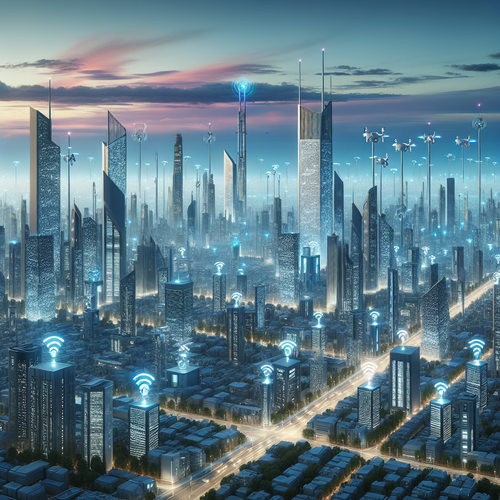
Unlocking the Potential of 5G in Smart Cities
Unlocking the Potential of 5G in Smart Cities
As cities continue to grow, the need for efficient infrastructure and interconnectivity has never been more critical. 5G technology plays a vital role in transforming urban environments into smart cities, enhancing connectivity, and revolutionizing the way people interact with their surroundings. In this post, we will explore the potential of 5G technology in smart cities, how it enhances urban living, and the challenges it presents.
Understanding 5G Technology
5G, the fifth generation of mobile network technology, promises to deliver faster data speeds, lower latency, and greater connectivity. With its advanced capabilities, 5G enables a wide range of applications including the Internet of Things (IoT), autonomous vehicles, and remote healthcare services. Its impact is profound, especially in the context of smart city development.
Key Benefits of 5G in Smart Cities
- Improved Connectivity: 5G technology supports massive IoT deployments, facilitating seamless communication between devices. As cities become more interconnected, the data from various sources can be analyzed to improve public services and enhance citizen experiences.
- Enhanced Public Safety: With faster data transfer rates, emergency services can respond more effectively to incidents. For example, smart cameras and sensors can alert authorities in real-time, allowing for quicker interventions.
- Efficient Resource Management: 5G enables real-time monitoring of urban resources, including energy, water, and waste management. This leads to optimized resource usage and improved sustainability.
- Transforming Transportation: 5G technology supports the development of smart traffic systems, allowing for better traffic management and reduced congestion in urban areas. Additionally, it enhances the feasibility of autonomous vehicles through reliable vehicle-to-everything (V2X) communication.
Challenges in Implementing 5G in Smart Cities
Despite the significant advantages, implementing 5G technology comes with challenges:
- Infrastructure Costs: The rollout of 5G requires substantial investment in infrastructure, including new towers and fiber-optic networks. This financial burden can be a major barrier for cities, especially those facing budget constraints.
- Technological Complexity: The integration of 5G technology with existing urban infrastructure may be complex. Cities need to ensure seamless compatibility between new and old systems, which can involve extensive planning and technological expertise.
- Cybersecurity Concerns: Increased connectivity raises the risk of cyber threats. As more devices become connected, ensuring robust cybersecurity measures will be essential to protect city data and infrastructure.
The Future of 5G in Smart Cities
As 5G technology continues to evolve, the potential for smart cities expands. Future advancements could focus on:
- Smart Grids: 5G will enable smarter energy grids that can automatically adjust to demand, leading to more sustainable energy use.
- Autonomous Public Transport: 5G will likely enhance the development of autonomous public transportation systems, providing safe and efficient travel for urban residents.
- Environmental Monitoring: Cities could leverage 5G to monitor air quality in real-time, helping mitigate pollution and improve public health.
Conclusion
5G technology holds immense potential for redefining urban living and advancing smart city initiatives. While challenges exist, the benefits of enhanced connectivity, improved public safety, and efficient resource management pave the way for a more sustainable future. As cities look to harness the power of 5G, collaboration between government, private sector, and citizens will be crucial. For insights into the transformative impact of technology on urban environments, check out our post on Smart Cities: The Future of Urban Living.
Embracing the Future of Urban Development
As we stand on the brink of a new era in urban development, the integration of 5G technology in smart cities will undoubtedly shape the modern landscape, fostering innovation, enhancing quality of life, and driving sustainable growth.













